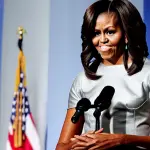In a world where economic challenges often overshadow the daily lives of everyday Americans, the impact of rising costs can feel overwhelming. It is becoming increasingly difficult for families to keep up with the skyrocketing prices of groceries, housing, and energy. Many people have experienced significant strain on their budgets, leading them to reevaluate their priorities and the political landscape leading up to the 2024 presidential election. A recent poll indicates that a staggering 95% of American voters will consider the economy as a key factor in their decision, a clear sign that the nation is awakening to the reality of its financial struggles.
Historically, economic crises have often proven to be watershed moments, prompting a reevaluation of leadership and policy. The Great Depression is a stark reminder of how quickly prosperity can turn to despair. Communities that thrived can find themselves in dire straits within the blink of an eye. The current economic turmoil has roots in complex decisions made over the years, with shifts in policy impacting inflation, job availability, and the cost of living. As inflation soared to a peak of 9% in 2022—up from 1.23% in 2020—Americans have felt the burden at the grocery store, where everyday essentials have seen price increases of up to 40%. Such dramatic shifts bring to mind the great economic upheavals of the past, urging citizens to look deeper into the causes and consequences of their current circumstances.
Navigating the blame game in politics can often feel like traversing a minefield. Politicians from both sides are eager to point fingers when economic conditions falter. One side casts its gaze back to decisions made during the Trump administration, particularly regarding pandemic relief spending, while the other attributes rising costs to recent spending under the Biden administration. The challenges of governance are magnified during times of crisis as leaders grapple with decisions that may have long-lasting repercussions. Citizens are left to ponder: Is the divide a partisan one, or is there a more profound lesson here involving accountability and fiscal responsibility?
Historical patterns reveal that sound economic management often hinges on prudent spending and a balanced approach to taxation. While tax cuts and increased government spending can appear as immediate solutions, they may have unforeseen consequences. The lasting impact of such policies can shape the economic landscape in ways that are challenging to unravel. Understanding the complexities of supply and demand illuminates why prices rise as production costs increase, reminding us of the interconnectivity between decisions made in Washington and the grocery bills faced by families across the country.
Both candidates present varying visions for the future as the political theatre approaches its climax with the election. On one side, the promise of slashing taxes and reducing regulations echoes past rhetoric of economic growth and stability. On the other, a focus on government regulation and environmental initiatives strives to address pressing issues like climate change, albeit at a financial cost. With families feeling the weight of rising expenses, the stakes could not be higher. Perhaps now is the time for voters to reflect on the deeper moral implications of their choices, weighing immediate economic relief against potential long-term effects on society and the environment.
As the nation stands at a crossroads, lessons from history serve as both guide and cautionary tale. The economy is not just a collection of numbers and policies; it represents the lived experiences of countless individuals and families. Voters are encouraged to consider today’s promises and legacies they may forge for future generations. In their quest for solutions to today’s challenges, they must carefully evaluate which candidate aligns with their vision of a free society that honors economic prosperity and ethical responsibility. The journey ahead may be fraught with uncertainty, but it is within today’s choices that tomorrow’s future will be shaped.




